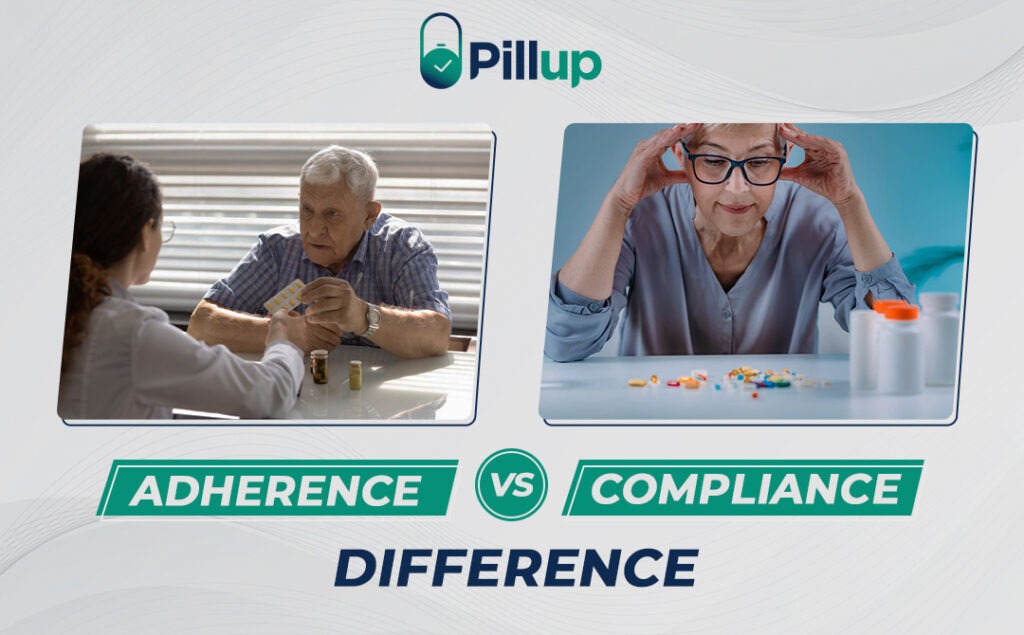Many people use the terms “adherence” and “compliance” interchangeably when talking about medication, but there is actually a big difference between the two. You are not the only one who is guilty of this – even medical professionals sometimes do it! But worry not in this article we will clear up the confusion and explain the difference between these two terms.
Adherence vs Compliance - Difference
On the surface, both, adherence and compliance, appear to denote the same thing i.e. following a treatment plan as prescribed. However, there are subtle but important differences between the two terms.
It is very possible that you might be compliant with your medication regimen but not adherent to it. In this article, we will look at the meaning of both terms, their usage, and some examples to illustrate the difference between adherence and compliance.
What is Adherence?
Adherence is defined as “The extent to which a person’s behavior– taking medication, following a diet, and executing lifestyle changes– corresponds with agreed recommendations from a healthcare provider”.
It is important to note that adherence is a measure of behavior and not just medication taking. Adherence also takes into account a person’s motivation for following the treatment plan
What is Compliance?
Compliance, on the other hand, is defined as “the extent to which a person follows medical advice”. This means it is a measure of how well a person follows the instructions given by their healthcare provider.
Unlike adherence, compliance is a yes or no measure. A person is either compliant or non-compliant with the instructions. There is no room for partial compliance. It is a measure of medication-taking behavior only and does not take into account a person’s motivation or other aspects of the treatment plan.
Usage
These terms are often used interchangeably in day-to-day conversation. However, in the medical field, there is a clear distinction between the two terms. Adherence is considered to be a more holistic measure of following a treatment plan, while compliance is a more limited measure that focuses on medication-taking behavior only.
Examples
Here are some examples to illustrate the difference between adherence and compliance:
Example 1
Mr. Mehra a diabetes patient is prescribed to use insulin injections and a strict diet plan. He takes the insulin injections as prescribed but does not follow the diet plan. In this case, Mr. Mehra is compliant with the treatment (taking the medication as prescribed) but not adherent (not following the diet plan)
Example 2
Ms. Arora with high blood pressure is prescribed medication and is told to exercise and reduce salt intake. She takes the medicines as prescribed and also follows the exercise and diet plan. In this case, Ms. Arora is both compliant (taking the medication as prescribed) and adherent (also following the exercise and diet plan).
What is the difference between compliance & adherence?
The key difference between adherence and compliance is that adherence is a measure of behavior while compliance is a yes or no measure. Adherence takes into account a person’s motivation for following the treatment plan, while compliance does not.
A person can be compliant without being adherent. For example, a person may take their medication as prescribed but not follow the diet or exercise plan. On the other hand, a person can be adherent without being compliant. For example, a person may follow the diet and exercise plan but face challenges in taking their medication as prescribed
In general, adherence is considered to be a more holistic measure of following a treatment plan, while compliance is a more limited measure that focuses on medication-taking behavior only.
Why people don’t follow their prescriptions?
People very often do not take their medications as prescribed for a variety of reasons. Some of the most common reasons include:
- Forgetting to take the medication
- Not understanding how to take the medication
- Side effects of the medication
- Cost of the medication
- Difficulty getting to the pharmacy
- Denial of the seriousness of the condition
It is important to note that non-adherence is a complex issue with many factors. It is not simply a matter of people forgetting to take their medication. There are often underlying reasons why people do not take their medication as prescribed.
What are the consequences of non-adherence?
Non-adherence to treatment can have serious consequences. Some of the most common consequences include:
- Worsening of the condition
- Increased risk of hospitalization
- Increased risk of death
What can be done to improve adherence?
There are many things that can be done to improve adherence. Some of the most important things include:
- Educating patients about their condition and the importance of taking their medication as prescribed
- Making sure patients understand how to take their medication correctly
- Working with patients to manage side effects
- Providing easy access to medications
- Reducing the cost of medications
- Making sure patients have transportation to get to the pharmacy
- Using Pillup’s Service
What is Pillup?
Pillup is a health tech firm that is using technology to improve adherence. Pillup’s services include:
Labeled Packets: Medications are pre-sorted into labeled packets according to the time of day they should be taken. These packets are easy to carry and you can take them with you wherever you go.
Pill reminders: Patients receive reminders to take their medication through call, WhatsApp, or the Pillup app.
Home delivery: Patients can have their medications delivered to their homes through the Pillup app.
We understand how important it is for people to take their medication as prescribed. We also know that non-adherence is a complex issue with many factors. That’s why we’ve developed a comprehensive solution that addresses all of the major barriers to adherence.
If you’re interested in knowing more about Pillup and how we can help you improve adherence, please contact us. We would be happy to answer any of your questions.



